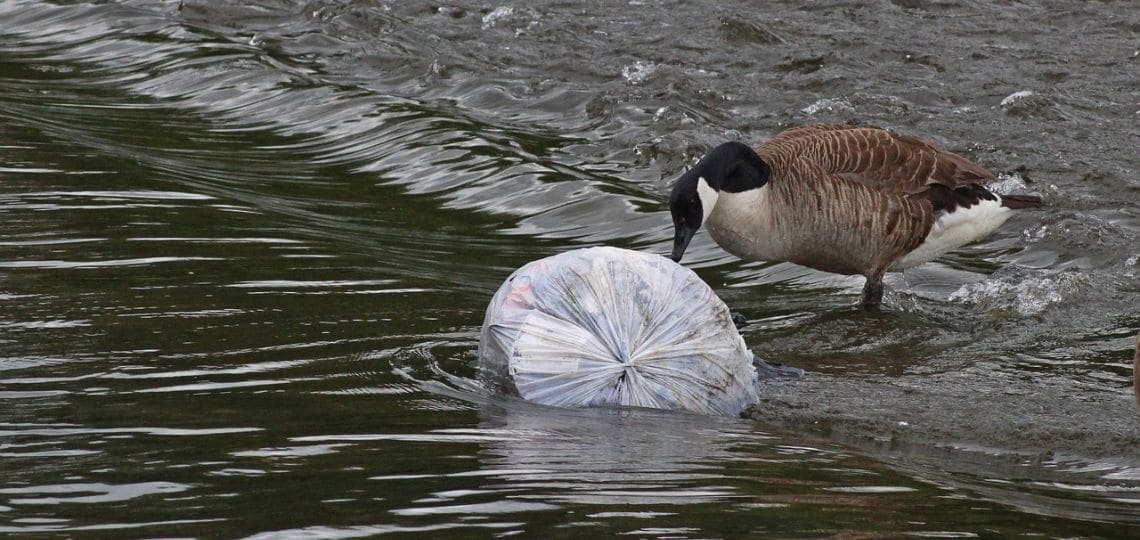As many Ecojustice supporters (like you!) know, Canada has a serious problem with plastic, and like you, the Ecojustice team is worried and determined to do something about it.
We have all heard the recent news stories about the amount of microplastics — up to 121,000 plastic particles — the average person consumes each year. We have also seen the damage plastic can do to our rivers, lakes and oceans, killing wildlife and damaging our ecosystems.
Canada’s recycling system is also broken, with only nine per cent of the 3.2 million tonnes of plastic waste generated each year in Canada being recycled. The rest — almost 2.8 million tonnes of waste, equal to the weight of 24 CN towers — ends up in Canadian landfills.
Calling for federal action
Thanks to supporters like you, Ecojustice has been at the forefront of tackling Canada’s plastic pollution and the problems that it causes for our environment. Last year – on behalf of several environmental organizations from across Canada – we submitted a legal request to the Minister of the Environment and Climate Change asking that she use Canada’s primary pollution law, the Canadian Environment Protection Act (CEPA), to crack down on plastic pollution. We asked that the Minister add single-use plastics, microplastics, and plastic microfibers to the Priority Substance List under CEPA, which would then require a thorough assessment of these substances’ impact on the environment and human health. Despite a legal requirement to respond to our request within 90 days, over a year has gone by without a response. The Ministers’ failure to respond to our request from last year was a missed opportunity to take action on dangerous plastics.
Determined to get the federal government to step up, in May, Ecojustice lawyer James Gunvaldsen Klaassen appeared before MPs on the Standing Committee on Environment and Sustainable Development in Ottawa to advocate for using CEPA to obtain a healthy environment for all Canadians, free from the dangers of plastics.
Following submissions made by Ecojustice, environmental groups and others, the Standing Committee on Environment and Sustainable Development produced a strong report. They made a number of recommendations in their report, including that:
- the federal government commits to banning single-use plastic;
- Canada should meet the goal of zero plastic waste by 2030;
- producers should be responsible for the plastic that they produce;
- the Department of Finance Canada eliminate fossil fuel subsidies which go to producing plastic.
Following the Standing Committee’s report, the federal government announced on June 10 it plans to ban single-use plastics as early as 2021. This is a welcome move by the federal government, but given that this is an election year, we are all too aware that such bold promises are meaningless unless they are followed by firm legal action, and time is running out. And still, the Minister has not responded to our initial request as she is legally required to.
Now is the time for real action on plastics
While the government’s declaration of its intention to ban single-use plastics and the Standing Committee’s strong recommendations signal movement in the right direction, banning single-use plastics under CEPA is a lengthy process that is unlikely to be complete before the election. We need to see legal action now or we risk losing momentum.
Your ongoing support is enabling Ecojustice to work with a coalition of like-minded groups to urge the federal government to put their intention into action by adding plastics to the Priority Substances List under CEPA now. Doing so will ensure plastics are on the federal agenda of any new government.
CEPA is a legal tool the federal government has at its disposal to address our plastics problem. This law allows them to assess the harm certain plastic products and packaging inflict on Canada’s marine, freshwater and terrestrial ecosystems, and move forward with legally-binding solutions to address pollution.
Along the beaches of Canada’s extensive shoreline, it is saddening to see the amount of plastic waste that has built up. One frightening warning is the projection that by 2050 there will be more plastic than fish in our oceans.
A healthy environment is important to us and Ecojustice will continue to use the power of the law to tackle the harmful and damaging effects of plastics on behalf of all Canadians.

